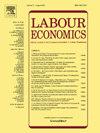Why does temporary work increase disability insurance inflow?
IF 2.6
2区 经济学
Q2 ECONOMICS
引用次数: 0
Abstract
We show that workers with fixed-term contracts are substantially more likely to apply for and be awarded disability insurance (DI) benefits than permanent workers. We study whether this differential can be explained by (i) selection of worker types into contracts, (ii) the relation between contract type and the risk of illness, (iii) differences in employer support during illness, and (iv) differences in labour market prospects of ill workers. We find that selection actually masks part of the differential, whereas the impact of contract type on health is limited. In contrast, the difference in employer support during illness is a significant cause of the heightened DI risk of temporary workers, especially in slack labour markets. We therefore conclude that, conditional on being ill, workers with fixed-term contracts face different support structures and incentives that make them more likely to ultimately apply for and be awarded DI.
为什么临时工增加伤残保险流入?
我们表明,与长期工人相比,有固定期限合同的工人更有可能申请并获得残疾保险(DI)福利。我们研究了这种差异是否可以通过以下几个方面来解释:(i)合同中工人类型的选择,(ii)合同类型与疾病风险之间的关系,(iii)患病期间雇主支持的差异,以及(iv)患病工人劳动力市场前景的差异。我们发现选择实际上掩盖了部分差异,而合同类型对健康的影响是有限的。相反,患病期间雇主支持的差异是临时工失业风险增加的一个重要原因,尤其是在劳动力市场疲软的情况下。因此,我们得出结论,在生病的条件下,有固定期限合同的工人面临不同的支持结构和激励措施,这使他们更有可能最终申请并获得残障保险。
本文章由计算机程序翻译,如有差异,请以英文原文为准。
求助全文
约1分钟内获得全文
求助全文
来源期刊

Labour Economics
ECONOMICS-
CiteScore
3.60
自引率
8.30%
发文量
142
期刊介绍:
Labour Economics is devoted to publishing research in the field of labour economics both on the microeconomic and on the macroeconomic level, in a balanced mix of theory, empirical testing and policy applications. It gives due recognition to analysis and explanation of institutional arrangements of national labour markets and the impact of these institutions on labour market outcomes.
 求助内容:
求助内容: 应助结果提醒方式:
应助结果提醒方式:


